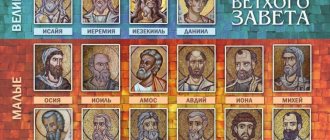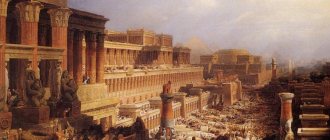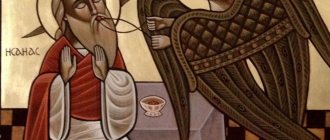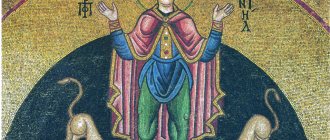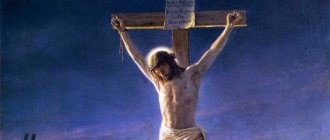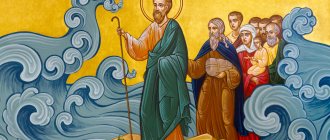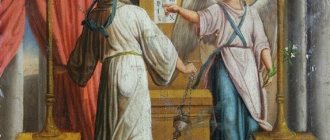Interpretation of the book of the prophet Isaiah.
The book of the prophet Isaiah is perhaps the most popular prophetic book of the Old Testament. Moreover, it is well studied. Theologians often turn to the texts of the prophet Isaiah.
The book deeply analyzes the history of the Jewish people at the end of the 19th and beginning of the 7th centuries. BC. Prophet Isaiah was born, raised and lived all his life in Jerusalem. Isaiah was an active public figure, so he managed to reflect the mood of the city on the eve of the Babylonian captivity.
Isaiah's sermons are directed mainly against the false, feigned piety of the Israelites. He calls sinners to repent before the judgment of God. He wanted to encourage the people of Israel to live in accordance with the highest ideals.
The main purpose of Isaiah's speeches is to recall the special relationship that connected the Israelites with God. This refers to the covenant between God and Abraham, according to which Israel, having entered into a special relationship with God, would become the owner of the land of Canaan. According to the Abrahamic Covenant, if God's chosen people disobey, they will be expelled from their borders, and will be returned to the promised land only when they return to worshiping their God. The second half of the book of Isaiah introduces the idea of consolation.
With his speeches, Isaiah reminded his contemporaries that their sins caused the fall of the Northern Kingdom. Now the people cannot escape God's judgment. However, the Lord is merciful and, according to the covenant, will return their lands to the people of Israel.
Isaiah preached the idea of a great Kingdom, where the people of Israel would go thanks to the Lamb of God, who would appear to the Jews in the flesh. Isaiah foresaw the appearance of Christ, which is why he was often called the evangelist of the Old Testament. The redemption of Israel will come, according to Isaiah, from the messiah, who will be able to redeem what the people failed. The atonement of the prophet Isaiah has a certain universal character. This is the restoration of the original order from chaos.
God appears in Isaiah's speech as a personal force operating in history. God is the main character in Isaiah's prophecy. The name of God is mentioned in different versions many times:
- Yahweh - more than 300 times,
- Elohim
- El
- Adonai
- Adon
- Yahweh Tzvaot / Hosts
- God of Israel
- Holy God
- God of Jacob
- Strong Israeli
- Redeemer
It is important that the prophet Isaiah calls God the Redeemer much more often than others, thereby emphasizing the possibility of redemption.
The Prophet Isaiah is mentioned in the New Testament more often than other prophets, which certainly indicates the authority of his book. There is also a mention in the Bible of the fact that Jesus read from the book of the prophet Isaiah.
Isaiah prophesied to the following kings of Judah:
- Uzziah,
- Jotham,
- Ahaz,
- Hezekiah.
This period of history was a time of political and spiritual decline of the Northern Kingdom, which led to the conquest of Israel by Assyria in 722 BC. e.
One of the main ideas of the book of Isaiah is not to seek protection from other states, but to trust in God.
Biblical tradition
The Old Testament prophet Isaiah, who lived in the 8th century BC, according to tradition is recognized as one of the four great prophets and the author of the book named after him.
Scripture says that the Lord sent him to the Jews, giving him the last opportunity to repent of the vices that had overwhelmed them. The weaker God’s people became spiritually, the stronger the voice of the prophet sounded, whose life was like a candle illuminating with its radiance the iniquities committed by the people.
It was during that troubled period in the history of Israel that his prediction sounded clearly and loudly about the coming Mission, who, having spent his earthly life among the Jews, would subsequently lead many fallen pagan nations to the Heavenly Father.
Literary Features of the Book of Isaiah.
The book of Isaiah is written in the excellent poetic languages of the ancient East. The language is epic and expressive. The images are majestic. Isaiah's sermons are particularly passionate.
The book of Isaiah contains the theme of the “ high road ” – the theme of following God’s Commandments. Also often mentioned is the theme of the “ remnant ” - here we are talking about those few who retain true faith in God.
Question of authorship.
Most biblical scholars consider the author of the book to be the prophet Isaiah, the son of Amos. According to legend, Isaiah was of royal descent and was related by blood to King Uzziah. The fact that Isaiah was of royal or aristocratic blood is supported by the fact that, according to his book, he had personal contacts with kings and high priests. This is evidenced by the following lines:
- And the Lord said to Isaiah: You and your son Shear-jasub go out to meet Ahaz, to the end of the water supply of the upper pond, to the road to the whitewash field.
- In those days Hezekiah fell mortally ill. And the prophet Isaiah, the son of Amoz, came to him and said to him: Thus says the Lord: Make a testament for your house, for you will die and not recover.
- And the prophet Isaiah came to King Hezekiah and said to him: What did these people say? and where did they come to you from? Hezekiah said: They came to me from a distant land, from Babylon.
Isaiah was a public figure, perhaps a priest. He was married and had two sons. The years of the prophet’s life have not been established for certain, but the year of birth is generally considered to be 765 BC. e. Scholars agree that Isaiah outlived King Hezekiah, so he wrote his biography, which was most likely done posthumously. The year of the prophet’s death is unknown, but he died no earlier than 686 BC. e. According to legend, by order of King Manasseh, the prophet Isaiah was given a terrible execution - he was sawed alive with a saw.
In liberal theology, it is believed that the Book of Isaiah was actually written by at least three different authors. The prophet Isaiah is considered the author of the first forty chapters. The authors of chapters 40-55 and 56-66 remain unknown. They are conventionally called Second Isaiah and Third Isaiah, respectively. It is believed that Deuteronomy Isaiah wrote in the middle of the 6th century BC. e., and Third Isaiah - in the middle of the 5th century BC. e.
Service time
According to the prophet himself, the Lord called him to serve in the year of the death of King Uzziah.
Unfortunately, due to the inconsistency of information about the period of the reign of the kings of Judah in the 3rd and 4th books of Kings, it is impossible to unambiguously determine the time of the beginning of his prophetic activity. Researchers believe that most likely this is the period between 747 and 734 BC.
Since the exact year of the prophet’s death is unknown, scientists believe that his ministry lasted approximately 50-60 years.
Prophets Ezekiel, Isaiah and Jacob
What Isaiah 53 Says
This chapter describes the coming of the Savior, who will come to suffer for the iniquities of the human race.
At the time of Isaiah, the people of Israel were already expecting the coming of the Mission, but they were waiting for the majestic Anointed of the Lord, who would come into the world and become the King of kings. Isaiah also predicted that the One who came would be despised and belittled by people, and that the Jews would not recognize Him when He appeared.
He also foresaw the suffering of the Son of God - His great feat, thanks to which all the sinful ulcers of humanity would be washed away and redemption would occur.
Priest Dimitri Predein says:
“One gets the impression that the prophet Isaiah seemed to have personally seen the suffering of Jesus Christ at the time of His scourging and stay on the Cross. These are amazing, incomparable lines. It was for these lines that the holy fathers called Isaiah the Old Testament evangelist - with such amazing accuracy he describes many features from the life of the Savior.”
Priest Sergius Muravyov, clergyman of the Church of Saints Peter and Fevronia in the village. Strelnya explains:
“The 53rd chapter seems to be an excerpt from the Gospel, it so vividly and accurately describes the sufferings of the Savior on the cross and their inner, deep essence.”
Vision
This event happened to the prophet when he was about 20 years old.
One day, in a vision, he saw the Lord sitting on a majestic throne, surrounded by six-winged Seraphim, chanting: “Holy, Holy, Holy is the Lord of Hosts! the whole earth is full of His glory!” At this moment the seer felt how unclean and sinful he himself was in comparison with the heavenly inhabitants, and how unclean his lips were, unworthy of praising the Lord.
Then one of the Seraphim, taking a coal from a red-hot brazier with tongs, approached Isaiah and touched his lips with it, saying:
“Behold, this has touched your mouth, and your iniquity is taken away from you, and your sin is purged.”
Archpriest Dimitri Predein explains the symbolism of this vision as follows:
“Coal symbolized the action of divine grace, which is capable of cleansing all human sins.”
Similar words are spoken today by clergy during their communion at the altar:
“Behold, I will touch my lips, and he will take away my iniquities and cleanse my sins.”
Interesting fact
The cleansing of Isaiah's lips is part of the Prophet's vision, an Old Testament prototype of the Eucharist. In addition, it symbolizes the Incarnation of the Lord and heralds the Nativity of Christ.
After this, the Lord asked: “Whom should I send? And who will go for Us?”, meaning that He needs a minister who will convey to the wicked Israeli people His Holy Will about the punishment that is overtaking the Jews. And then the young man volunteered to be that messenger.
From that moment his prophetic ministry began.
About the New Jerusalem
This amazing prophecy tells of the final triumph of the Creator, of times of universal peace and prosperity for those who walk the path of holiness in their lives.
Isaiah predicts that a time will come when the pagan nations, having accepted the Good News, will stop cruel civil wars and will no longer be at enmity:
“And they shall beat their swords into plowshares, and their spears into pruning hooks; nation shall not lift up sword against nation, neither shall they learn war any more.”
(Isa. 2:4)
At the same time, the external environment around spiritually transformed people will also change:
“Then the wolf will live with the lamb, and the leopard will lie down with the kid; and the calf, and the young lion, and the ox will be together, and a little child will lead them. And the cow will graze with the she-bear, and their cubs will lie down together, and the lion will eat straw like the ox. And the baby will play in the asp’s hole. and the child will stretch out his hand into the viper’s nest.”
(Isa.11:6-8)
The peoples who have earned the right to enter the New Kingdom will be in joy and will forget what suffering and illness are:
“Then the eyes of the blind will be opened, and the ears of the deaf will be unstopped. Then the lame will leap like a deer, and the tongue of the dumb will sing; For waters will break out in the desert, and streams in the desert. And the ghost of the waters will turn into a lake, and the thirsty land into springs of water... those redeemed by the Lord will come to Zion with joyful shouting; and everlasting joy will be upon their heads; they will find joy and gladness, and sorrow and sighing will be removed.”
(Isa. 35:5-7, 10)
He also prophesied about the fall of Jerusalem and the ruin of Judea. He mentioned the great Cyrus, the Persian ruler, who later allowed the Jews to return to their homeland.
This seer also predicted a lot about the fate of other peoples living on earth at that time. For example, he predicted the destruction of the Babylonian kingdom due to the wickedness and arrogance of the Babylonians:
“And Babylon, the beauty of kingdoms, the pride of the Chaldeans, will be overthrown by God, like Sodom and Gomorrah, and will never be inhabited, and for generations there will be no inhabitants in it.”
(Isa. 13:19-20)
He also predicted the fall of the Philistine land:
“You will be disintegrated, all the land of the Philistines, for smoke comes from the north, and there is no one left behind in their hordes” (Is. 14:31), and the destruction and dispersion of the Moabites: “Ar-Moab will be devastated and destroyed... My heart weeps for Moab; they flee from it to Zoar, to the third Egla; because the waters of Nimrim have dried up, the meadows have dried up, the grass has burned up, there is no greenery” (Is. 15:1, 5-6), “the greatness of Moab will be humiliated with all the great multitude, and the remnant will be very small and insignificant.” (Isa. 16:14).
Isaiah was the first of the prophets to proclaim that not only the people of God, but also other nations have value in the eyes of the Creator. He predicted that Egypt and Assyria would glorify the Lord in due time :
“And the Lord will reveal Himself in Egypt; and the Egyptians in that day will know the Lord, and will offer sacrifices and gifts, and will make vows to the Lord, and will fulfill... They will turn to the Lord, and He will hear them, and will heal them. And the Egyptians together with the Assyrians will serve the Lord.”
(Isa. 19:21-23)
Prophecies of Isaiah
